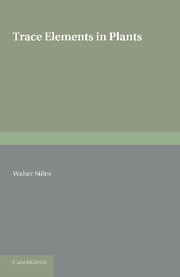Book contents
- Frontmatter
- Dedication
- Contents
- Preface
- Preface, to the First Edition
- List of Plates
- List of Abbreviations
- I HISTOBICAL INTRODUCTION
- II METHODS OF INVESTIGATING MICRO-NUTRIENT PROBLEMS
- III TRACE-ELEMENT DEFICIENCY DISEASES OF PLANTS
- IV THE EFFECTS ON PLANTS OF TRACE-ELEMENT EXCESS
- V FACTORS INFLUENCING THE ABSORPTION OF TRACE ELEMENTS AND THEIR EFFECTS ON PLANTS
- VI THE FUNCTIONS OF TRACE ELEMENTS IN PLANTS
- VII TRACE ELEMENTS IN PLANTS IN RELATION TO SOME DISEASES OF GRAZING ANIMALS
- VIII CONCLUDING REMARKS
- List of Literature
- Index
V - FACTORS INFLUENCING THE ABSORPTION OF TRACE ELEMENTS AND THEIR EFFECTS ON PLANTS
Published online by Cambridge University Press: 05 June 2016
- Frontmatter
- Dedication
- Contents
- Preface
- Preface, to the First Edition
- List of Plates
- List of Abbreviations
- I HISTOBICAL INTRODUCTION
- II METHODS OF INVESTIGATING MICRO-NUTRIENT PROBLEMS
- III TRACE-ELEMENT DEFICIENCY DISEASES OF PLANTS
- IV THE EFFECTS ON PLANTS OF TRACE-ELEMENT EXCESS
- V FACTORS INFLUENCING THE ABSORPTION OF TRACE ELEMENTS AND THEIR EFFECTS ON PLANTS
- VI THE FUNCTIONS OF TRACE ELEMENTS IN PLANTS
- VII TRACE ELEMENTS IN PLANTS IN RELATION TO SOME DISEASES OF GRAZING ANIMALS
- VIII CONCLUDING REMARKS
- List of Literature
- Index
Summary
REFERENCES have been made in the course of the preceding pages to researches in which it has been found that, with concentrations of one or other of the trace elements below a certain minimum, symptoms of deficiency of that element occur. Similarly, as regards the toxic effects of excess concentrations, limits of concentration have been indicated above which injury results. It is, however, clear that minimum and maximum values of this kind have no very precise significance, for the rate of absorption of a mineral constituent depends on a number of variable factors of which the concentration of the element is only one. Other factors may include, first, the presence of other substances and ions in the medium and their nature and concentration, and, secondly, conditions in the plant which are largely a matter of speculation but the effect of which is indicated by the different absorptive capacities of different plants. Where the medium from which the trace element is absorbed is soil, the content of the element in the soil may be little guide to its actual concentration in the soil solution, the medium from which the element is directly absorbed. Here the nature of the compound containing the element, other substances present in the soil, both mineral and organic, the hydrogen-ion concentration and the activity of micro-organisms, factors which are by no means all independent of one another, may all play a part in determining the actual amount or concentration of the element available for absorption.
Data have also been presented indicating that plants suffering from a deficiency of an element have a lower content of it than normal healthy plants, while plants exhibiting injury through excess of it contain more of the element than normal plants. While these differences may be usual they are not universal, as examples given earlier indicate, and the content of an element in a plant is thus not an absolute criterion of whether it is present in deficient or excess quantity. The state in which the element is held in the plant would thus appear to be of importance in determining its effect on growth. This has been particularly brought out in work with manganese.
- Type
- Chapter
- Information
- Trace Elements in Plants , pp. 114 - 142Publisher: Cambridge University PressPrint publication year: 2013



